62 BECOMING KING enduring faith in the transforming and redemptive possibilities of love 16 proved to be an unwavering conviction of his public ministry. A few days after moving to Montgomery, King attended the National Baptist Convention in St. Louis, where he delivered an address before the women’s auxiliary. Despite the unsuccessful effort to integrate Mont- gomery’s public schools, King offered an optimistic speech trumpeting the inevitability of racial progress, desegregation, and social change: “Ul- timately history brings into being the new order to blot out the tragic reign of the old order.” During his first year at Dexter, King continued to believe that “the tide has turned” and “segregation is passing away.” On the ground in Montgomery, however, dissatisfaction with the degrading effects of segregation grew. Whether inspired by optimism in the wake of the Brown decision or simply fed up with the racial status quo, several people in the city were ready to stand up and be counted in the fight for 17 true freedom. At the front of the line, as had been the case for several decades, was E. D. Nixon. In addition to his attempt to register black students in white schools, he also became the first African American since the beginning of the twentieth century to run for public office in a Montgomery County Democratic primary. Although he lost the race, he continued to set a bold example for blacks by challenging any so-called restrictions imposed by white society. During the summer of 1954, Nixon was named the chair- person of a voter registration effort for the 2nd Congressional District in Alabama. In his remarks at the organization’s meeting, Nixon vowed to “lead the fight to open the way for Negro voting.” In homage to Nix- on’s efforts in 1954, the “colored section” of the Montgomery Advertiser 18 named him Montgomery’s “Man of the Year.” Despite Nixon’s activism, most African American men avoided overt challenges to Montgomery’s racist laws and mores. As a member of the Brotherhood of Sleeping Car Porters whose job was not tied to the local community, Nixon was less vulnerable to economic retribution by local whites. Those whose service jobs depended on the goodwill of local white businessmen could not afford to share Nixon’s boldness. According to Jo Ann Robinson, many black men stopped riding the city buses during this period, fearing the abuse and humiliation they so often received from bus drivers. They also were tired of feeling powerless while drivers disrespect-
 Becoming King: Martin Luther King Jr. Page 82 Page 84
Becoming King: Martin Luther King Jr. Page 82 Page 84